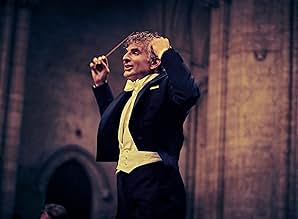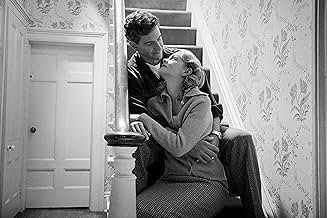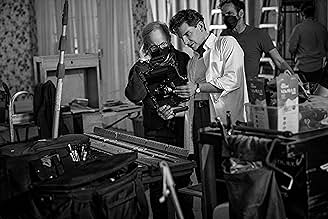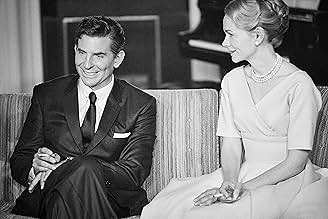लियोनार्ड और फ़ेलिशिया का जटिल प्रेम, 1946 में एक पार्टी में मिलने के समय से और दो सगाई, 25 साल की शादी और तीन बच्चों के माध्यम से जारी रहा.लियोनार्ड और फ़ेलिशिया का जटिल प्रेम, 1946 में एक पार्टी में मिलने के समय से और दो सगाई, 25 साल की शादी और तीन बच्चों के माध्यम से जारी रहा.लियोनार्ड और फ़ेलिशिया का जटिल प्रेम, 1946 में एक पार्टी में मिलने के समय से और दो सगाई, 25 साल की शादी और तीन बच्चों के माध्यम से जारी रहा.
- 7 ऑस्कर के लिए नामांकित
- 27 जीत और कुल 180 नामांकन
फ़ीचर्ड समीक्षाएं
Think of a biopic of a famous person as like a complex cake - you can carefully dissect one slice of it to examine the contents, or you can bravely try to examine the whole lot to see what it's made of.
This biopic of American composer and conductor Leonard Bernstein is like looking at only the surface of the cake through a slice of Swiss cheese - a lot of loosely connected vignettes with no depth. If you don't know much about the man, you would leave the theatre with no great insights about him.
The film jumps around in time and gives you snippets of the man's life and work. There are scenes about his bisexuality and penchant for men, his role as a conductor and composer, his drug addictions and his relationship with his daughter, but none of these are examined in any depth at all. His bipolar relationship with his wife and her later death from cancer are given the most screen time, but still feels unfulfilled and lacking in substance.
Bradley Cooper directs in a rather disjointed style. The first half is shot in black and white, then we change to colour for no good reason except maybe historical chronology - it doesn't work. Neither does the curiously tight aspect ratio, which again inexplicably opens up to full screen near the end. Some scenes are beautifully shot but too often Cooper relies on the slow zoom in and the very long takes, which don't always seem to match the scene. The film also could have ended perfectly with the penultimate scene, but inexplicably ruins the moment with one extra shot that completely fails to land.
Carey Mulligan is excellent as Bernstein's wife but Cooper as Bernstein doesn't quite work for me. He tends to overact, gives you little insight into the man himself, and the nasal voice starts to grate after a while - maybe it was inevitable with the prosthetic nose he was required to wear.
Even the grand concert scene in the cathedral, conducting his beloved Mahler, didn't quite generate the depth of feeling it could have - contrast this with the Tchaikovsky concert scene in the French-Russian film Le Concert, which takes emotion (actors and viewers) to a much higher level.
All in all this is not a bad movie, and to be fair it does engage the viewer a little more in the second half. But it tackles too many themes with a disturbing superficiality, giving very little substance to almost any. It could have been a lot better. No doubt however it will get lots of Oscar nominations, but then the Academy lost the plot years ago and succumbs to hype more than merit.
This biopic of American composer and conductor Leonard Bernstein is like looking at only the surface of the cake through a slice of Swiss cheese - a lot of loosely connected vignettes with no depth. If you don't know much about the man, you would leave the theatre with no great insights about him.
The film jumps around in time and gives you snippets of the man's life and work. There are scenes about his bisexuality and penchant for men, his role as a conductor and composer, his drug addictions and his relationship with his daughter, but none of these are examined in any depth at all. His bipolar relationship with his wife and her later death from cancer are given the most screen time, but still feels unfulfilled and lacking in substance.
Bradley Cooper directs in a rather disjointed style. The first half is shot in black and white, then we change to colour for no good reason except maybe historical chronology - it doesn't work. Neither does the curiously tight aspect ratio, which again inexplicably opens up to full screen near the end. Some scenes are beautifully shot but too often Cooper relies on the slow zoom in and the very long takes, which don't always seem to match the scene. The film also could have ended perfectly with the penultimate scene, but inexplicably ruins the moment with one extra shot that completely fails to land.
Carey Mulligan is excellent as Bernstein's wife but Cooper as Bernstein doesn't quite work for me. He tends to overact, gives you little insight into the man himself, and the nasal voice starts to grate after a while - maybe it was inevitable with the prosthetic nose he was required to wear.
Even the grand concert scene in the cathedral, conducting his beloved Mahler, didn't quite generate the depth of feeling it could have - contrast this with the Tchaikovsky concert scene in the French-Russian film Le Concert, which takes emotion (actors and viewers) to a much higher level.
All in all this is not a bad movie, and to be fair it does engage the viewer a little more in the second half. But it tackles too many themes with a disturbing superficiality, giving very little substance to almost any. It could have been a lot better. No doubt however it will get lots of Oscar nominations, but then the Academy lost the plot years ago and succumbs to hype more than merit.
It's an old (and unanswerable) question: to what extent is it possible - or desirable - to separate the art from the artist? Is it possible to appreciate the art simply as art, and not to delve into the (sometimes tawdry) details of the artist? Or are the art and the artist so inextricably entwined that you cannot understand the one without knowing the other?
I very much lean towards separation. I fell in love with Bernstein's music the first time I saw West Side Story mumble years ago at an impressionable age; which is why I was disappointed that there was so little West Side Story in this film. Surely a biopic of a composer should feature that composer's music pretty heavily?
Of course, we all know that beneath every great artist is a human being - usually with a collection of human flaws. But does this matter? Well, it matters here. What we mostly get is a film about Leonard the man, and his complicated marriage to Felicia Montealegre. Much of this was new to me. I knew that Bernstein was bisexual, but didn't care. I find that I also don't care about most of the other details of his life which were revealed to me - although if the film was truly about the man, not his music, his record as a human rights activist should probably have been at least touched on. But never mind that: I came for the music, and didn't get enough.
Not that this film is without merit. Bradley Cooper's performance is first class - there's one sequence in which he truly shows us the passion of a great conductor - and Carey Mulligan is as riveting as ever. Cinematography and sound are both excellent.
Overall, this is a good film, but ultimately a disappointing one.
I very much lean towards separation. I fell in love with Bernstein's music the first time I saw West Side Story mumble years ago at an impressionable age; which is why I was disappointed that there was so little West Side Story in this film. Surely a biopic of a composer should feature that composer's music pretty heavily?
Of course, we all know that beneath every great artist is a human being - usually with a collection of human flaws. But does this matter? Well, it matters here. What we mostly get is a film about Leonard the man, and his complicated marriage to Felicia Montealegre. Much of this was new to me. I knew that Bernstein was bisexual, but didn't care. I find that I also don't care about most of the other details of his life which were revealed to me - although if the film was truly about the man, not his music, his record as a human rights activist should probably have been at least touched on. But never mind that: I came for the music, and didn't get enough.
Not that this film is without merit. Bradley Cooper's performance is first class - there's one sequence in which he truly shows us the passion of a great conductor - and Carey Mulligan is as riveting as ever. Cinematography and sound are both excellent.
Overall, this is a good film, but ultimately a disappointing one.
We don't know much about Leonard Bernstein. We didn't learn why he wanted to be a composer or how he got in the business. His relationship wasn't very clear either. He's bisexual, but that doesn't go anywhere. His wife isn't explained much either other than being a stage actress. We don't know much about his children. The timelines aren't clear when the movie takes place. It seems to start in the 50s other than the opening scene of him as an old man. I do like Bradley Cooper's performance, but not much comes from the character. We don't know what made him famous since he was already famous before his memorable score in On the Waterfront.
The acting is superb and particularly Carey Mulligan who is astonishing, as usual, and Bradley Cooper's transformation is incredible. The look and feel throughout is very polished. But, and this isn't a minor quibble -- I found it really hard to understand the dialogue! Characters speak so quickly, in a mumble, that I actually considered putting on subtitles. Anyway, it wouldn't have made a difference, I thought the movie was so empty and plotless and uninteresting. There was really no tension in the wife's dealing with her husband's bisexuality, no real exploration or understanding of Bernstein's conflicts, and no delving into his achievements or their context, so there wasn't much left!
Obviously made for the Academy to truly honor Bradley Cooper remarkable transformation into the hoity toity world of Leonard Bernstein. Yes, we know he is going to be great in this role. But sometimes when you surround yourself with Oscar level material and talent, it could seem like it's just fishing for the Little Gold dude.
This is what it felt like. Though, simultaneously...he's just good.
Actor turned directors don't always work. Especially virtuosos that started clownish and end up in the serious zone. Cooper is that guy. Following in the footsteps of Clint Eastwood rather than, say Charles Laughton. It felt like a natural transition for Cooper who seemed to fine tune his energies towards more serious endeavors outside of things like "The Hangover" flicks.
"Silver Linings Playbook" was the start.
And who are his mentors in directing if it weren't the top tier directors.... David O' Russell, Paul Thomas Anderson, Spielberg, Scorsese or Clint Eastwood himself.
What this film struggles with, is the interest level. A lot will go over modern audiences head. Simply because we only know him as the guy who did the music to "West Side Story" And even THAT is stretching it. Cooper doesn't focus his energy on that rather this "love" story of a woman who fell for a gay guy. This would've been interesting 30 years ago. Now, not as intriguing.
Carey Mulligan is the best thing in this movie. At times, she is very much a Katherine Hepburn North Atlantic phony. But when some of the veil of her pain rises to the surface, she drops the pleasantries and tells it like it is.
There is a moment during a Thanksgiving party where we see some of the best acting I've seen between two people. Dialogue is somewhat on the nose, but boy do they both play it to the hilt. It's phenomenal, the ability to get to a screaming match with the words actually meaning something. That is an accomplishment.
Things get slow when the self-indulgent conducting moment creeps in. Yes, we know Brad studied a long time to get Bernstein's mannerisms. Do we really have to see all of it?
Other things that bothered me... it still feels like a very cold movie. Aside from Mulligan, his entire family seems to have been plugged in as trope characters to get you more understanding of the guy. They don't add much. Perhaps that was attempting to be subtle. It felt like subterfuge.
This was Oscar bait in absolute.
This is what it felt like. Though, simultaneously...he's just good.
Actor turned directors don't always work. Especially virtuosos that started clownish and end up in the serious zone. Cooper is that guy. Following in the footsteps of Clint Eastwood rather than, say Charles Laughton. It felt like a natural transition for Cooper who seemed to fine tune his energies towards more serious endeavors outside of things like "The Hangover" flicks.
"Silver Linings Playbook" was the start.
And who are his mentors in directing if it weren't the top tier directors.... David O' Russell, Paul Thomas Anderson, Spielberg, Scorsese or Clint Eastwood himself.
What this film struggles with, is the interest level. A lot will go over modern audiences head. Simply because we only know him as the guy who did the music to "West Side Story" And even THAT is stretching it. Cooper doesn't focus his energy on that rather this "love" story of a woman who fell for a gay guy. This would've been interesting 30 years ago. Now, not as intriguing.
Carey Mulligan is the best thing in this movie. At times, she is very much a Katherine Hepburn North Atlantic phony. But when some of the veil of her pain rises to the surface, she drops the pleasantries and tells it like it is.
There is a moment during a Thanksgiving party where we see some of the best acting I've seen between two people. Dialogue is somewhat on the nose, but boy do they both play it to the hilt. It's phenomenal, the ability to get to a screaming match with the words actually meaning something. That is an accomplishment.
Things get slow when the self-indulgent conducting moment creeps in. Yes, we know Brad studied a long time to get Bernstein's mannerisms. Do we really have to see all of it?
Other things that bothered me... it still feels like a very cold movie. Aside from Mulligan, his entire family seems to have been plugged in as trope characters to get you more understanding of the guy. They don't add much. Perhaps that was attempting to be subtle. It felt like subterfuge.
This was Oscar bait in absolute.
क्या आपको पता है
- ट्रिवियाOf the scene in which Leonard Bernstein conducts the London Symphony Orchestra at the Ely Cathedral in 1976, Bradley Cooper said, "That scene I was so worried about because we did it live... I was recorded live. I had to conduct them. And I spent six years learning how to conduct six minutes and 21 seconds of music. I was able to get the raw take where I just watched Leonard Bernstein [conduct] at Ely Cathedral... And so I had that to study."
- गूफ़The day after Bernstein makes his wildly successful debut with the N.Y. Philharmonic in November of 1943, the story is carried on the front page of the N.Y. Times. One of his friends notes that the front page also includes a headline reading "Hitler Bombs Poland." Germany had bombed and conquered Poland in September, 1939, so the country had already been under German occupation for over four years at the time of Bernstein's debut concert.
- भाव
Leonard Bernstein: Summer sang in me a little while, it sings in me no more. Edna St. Vincent Millay.
Felicia Montealegre: If the summer doesn't sing in you, then nothing sings in you. And if nothing sings in you, then you can't make music.
- कनेक्शनFeatured in Chris Plante: The Right Squad: एपिसोड #1.70 (2023)
टॉप पसंद
रेटिंग देने के लिए साइन-इन करें और वैयक्तिकृत सुझावों के लिए वॉचलिस्ट करें
- How long is Maestro?Alexa द्वारा संचालित
विवरण
- रिलीज़ की तारीख़
- कंट्री ऑफ़ ओरिजिन
- आधिकारिक साइट
- भाषा
- इस रूप में भी जाना जाता है
- Rybernia
- फ़िल्माने की जगहें
- उत्पादन कंपनियां
- IMDbPro पर और कंपनी क्रेडिट देखें
बॉक्स ऑफ़िस
- बजट
- $8,00,00,000(अनुमानित)
- दुनिया भर में सकल
- $3,83,532
- चलने की अवधि2 घंटे 9 मिनट
- रंग
- ध्वनि मिश्रण
- पक्ष अनुपात
- 1.33 : 1
इस पेज में योगदान दें
किसी बदलाव का सुझाव दें या अनुपलब्ध कॉन्टेंट जोड़ें
































